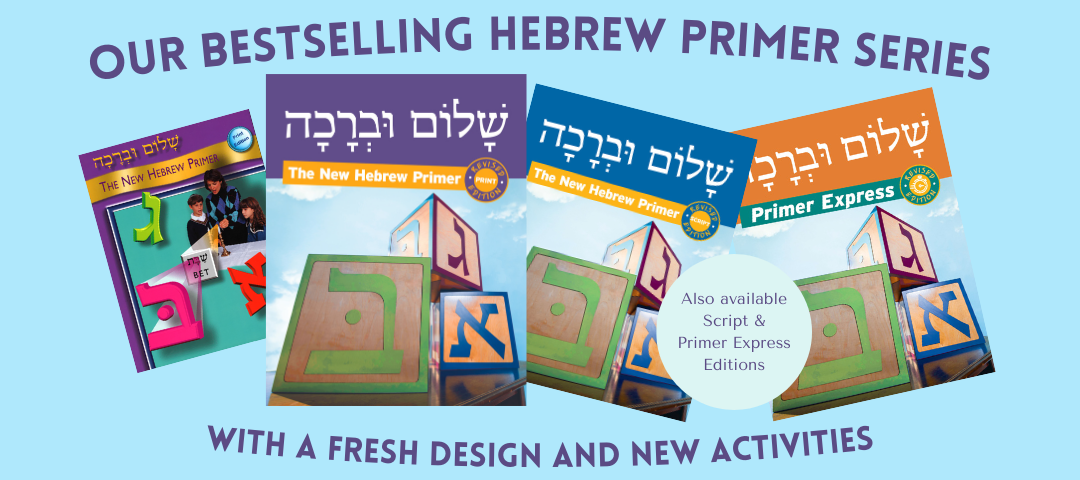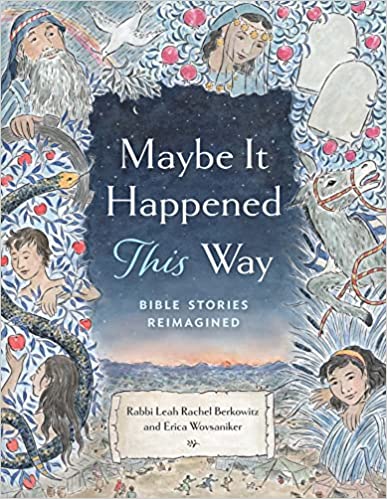Teacher Resources
-
15 JanRead more »
New fo rthe 2026-2027 school year, an entirely new way to study Torah, using the character strengths from the VIA Institute.
-
5 JanRead more »

We enjoy your company and now there are more ways than ever to keep in touch!
First, make sure you are getting the Behrman House Newsletter, a great way to:
- See previews of new materials
- Find guidance on curriculum planning
- Get early notification about special events and sales
- Discover seasonal instant lessons on a variety of subjects, and more
If you are new to your position or have changed your email address, be sure to subscribe
-
21 AugRead more »

From midweek Hebrew zoom groups to remote tutorials, turn-page supplements of our Hebrew materials help teachers keep students literally on the same page. And now they include more online activities, audio-led reading practice, and games.
The interactive turn-page supplements for all our Shalom Uvrachah primers feature:
- A video introducing each letter
- Hebrew reading practice for new letters
- Word-by-word audio for the “Ready, Set, Read” activities
- All reading practice available in both Israeli and American accents
- A game at the end of each lesson
The digital supplements are available for the rev
-
31 JulRead more »
Jonathan Shmidt Chapman shows us how to tell Bible stories to children.
-
3 NovComing in June 2024, the best Bible resource book ever, from award winner and 2023 Covenant Foundation Jewish Family Education Fellow Jonathan Schmidt Chapman.Read more »
-
17 OctToday more than ever, North American children and teens want to discuss Israel. Here are online and downloadable resources you can use today to engage them (and even their parents) in discussion, help them find answers to their questions, and help them grapple with the historical context of today's crisis.Read more »
-
24 MayRead more »
Think about a time when you stepped into a classroom or event or any room full of unfamiliar faces. Daunting, right?
Using creativity, practical tools, and a little prep work, you can help your students and staff break the ice and begin building relationships quickly and successfully.
Relationships lie at the core of successful education, and icebreakers help initiate and grow relationships, according to Batsheva Frankel in The Jewish Educator's Companion: Practical Tools and Inspirational Ideas. Icebreakers accomplish many things — they can create a sense of community, encourage trust, and allow for better bonding experiences.
-
26 AprRead more »
Teachers form the backbone of Jewish education.
It's nice to show them gratitude with a gift as the year comes to a close. Here are some of our favorite ideas.
Keeping an eye on the budget? Remember that quantity discounts are available. Log in to your school account to get the best discounts.
Maybe It Happened This Way

The Chicago chapter of the ARJE this year gifted its members this midrashic approach to Bible, combining storytelling with learning.
Maybe It Happened This Way: Bible
-
1 MarRead more »
In Teach Them Diligently, Bonnie K. Stevens writes how the joyfulness and energy of Purim celebrations provide educators with opportunties to reflect on the role arts can play in Jewish education.
-
8 FebRead more »
Yom HaShoah begins this year on April 17.
Each passing year brings on a greater urgency to recall this dark time in our history. With fewer living witnesses able to tell their stories firsthand, we need a new way to fulfill the responsibility that Holocaust survivors have entrusted to us - to remember, to tell the story, and to act.
Plan now using a powerful new approach.
Light from the Darkness: A Ritual for Holocaust Remembrance is a 45-minute, structured seder-like experience that helps the next generations remember and honor the Holocaust. It can be done either in-person or virtually. And it is deeply moving.
“It’s out


